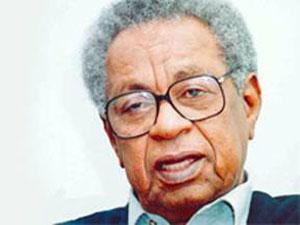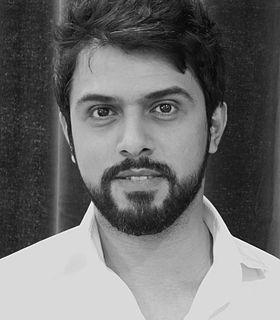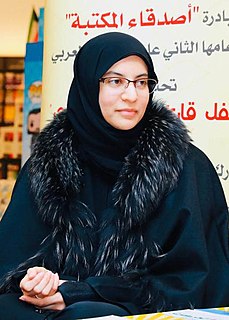Related Research Articles
Arabic literature is the writing, both as prose and poetry, produced by writers in the Arabic language. The Arabic word used for literature is Adab, which is derived from a meaning of etiquette, and which implies politeness, culture and enrichment.

Tayeb Salih was a Sudanese writer, cultural journalist for the BBC Arabic programme as well as for Arabic journals, and a staff member of UNESCO. He is best known for his novel Season of Migration to the North, considered to be one of the most important novels in Arabic literature. His novels and short stories have been translated into English and more than a dozen other languages.

Culture of Kuwait describes the cultural aspects of the Kuwaiti society and is part of the Eastern Arabian culture. Kuwaiti popular culture, in the form of dialect poetry, film, theatre, radio and television soap opera, flourishes and is even exported to neighboring states. Within the Arab states of the Persian Gulf, the culture of Kuwait is the closest to the culture of Bahrain.

Hebrew literature consists of ancient, medieval, and modern writings in the Hebrew language. It is one of the primary forms of Jewish literature, though there have been cases of literature written in Hebrew by non-Jews. Hebrew literature was produced in many different parts of the world throughout the medieval and modern eras, while contemporary Hebrew literature is largely Israeli literature. In 1966, Agnon won the Nobel Prize for Literature for novels and short stories that employ a unique blend of biblical, Talmudic and modern Hebrew, making him the first Hebrew writer to receive this award.
Sudanese literature consists of both oral as well as written works of fiction and nonfiction that were created during the cultural history of today's Republic of the Sudan. This includes the territory of what was once Anglo-Egyptian Sudan, the independent country's history since 1956 as well as its changing geographical scope in the 21st century.
Ghassan Hamdan is an Iraqi scholar, poet and translator.

Egyptian literature traces its beginnings to ancient Egypt and is some of the earliest known literature. Ancient Egyptians were the first to develop written literature, as inscriptions or in collections of papyrus, precursors to the modern book.
Leila is a feminine given name in the Semitic and Iranian languages. In Latin alphabet the name is commonly spelled in multiple ways, including Laela, Laelah, Laila, Layla, Laylah, Leila, Leilah, Leela, Leighla, Lejla, Leyla and Leylah.

Mohamed Saïd Raïhani is a Moroccan translator, novelist and short-story writer born on December 23, 1968 in Ksar el Kebir, north of Morocco. He is a member of Moroccan Writers’ Union, holder of a PhD degree in Translation from King Fahd Advanced School of Translation in Tangier/Morocco, an M.A. degree in Creative Writing from Lancaster University, a second M.A. degree in Translation, Communication & Journalism from King Fahd Advanced School of Translation and a B.A. degree in English Literature from Abdelmalek Essaadi University in Tétouan/Morocco.
Ismail Fahd Ismail or Ismāʿīl Fahd Ismāʿīl. was a Kuwaiti novelist, short story writer, and literary critic. He was acclaimed as the finest and most prolific writer in the history of Kuwait, with over twenty novels and numerous short story collections and publications.
Fatma Yousif al-Ali is a Kuwaiti journalist and short story writer. A graduate in Arabic Literature from Cairo University, in 1971 she became the first Kuwaiti woman to write a novel. She has also published four collections of short stories. She is a prominent member of the Kuwaiti Literary Association. Her work has been published in Banipal magazine.
Laila al-Othman is a Kuwaiti writer, novelist, short story writer, and a famous fictionist who was born into a prominent Kuwaiti family in 1943, and only 22 years later she made her writing debut in a local newspaper featuring her opinion on social and literary issues. During the course of her career, she has published 14 collections of short stories, nine novels, and many news articles.
The literature of Bahrain has a strong tradition in the country. Most traditional writers and poets write in the classical Arabic style, contemporary poets that write in this style include Ali al-Sharqawi, Qassim Haddad, Ebrahim Al-Arrayedh, and Ahmad Muhammed Al Khalifa. In recent years, the number of younger poets influenced by western literature are rising, most writing in free verse or prose poetry, and often including political or personal content. Almost all publications of poetry in the country are in Arabic, with poetry rarely published in English without requiring prior translation.

Saud Alsanousi is a Kuwaiti novelist and journalist. His debut novel The Prisoner of Mirrors (2010) won the Leila Othman Prize. In 2011, his short story The Bonsai and the Old Man won a competition organized by Al-Arabi magazine and BBC Arabic. His novel The Bamboo Stalk, written from the perspective of a boy of mixed Kuwaiti-Filipino parentage about his struggle to find a place in either country, won the International Prize for Arabic Fiction (2013).
The instance that marked the shift in the whole of Arabic literature towards modern Arabic literature can be attributed to the Arab World-West contact during the 19th and early 20th century. This contact resulted in the gradual replacement of Classical Arabic forms with Western ones. Genres like plays, novels, and short stories were coming to the fore. Although the exact date in which this reformation in literary production occurred is unknown, the rise of modern Arabic literature was "inseparable" from the Nahda, also referred to as the Arab Renaissance.

Qatari literature traces its origins back to the 19th century. Originally, written poetry was the most common form of expression, but poetry later fell out of favor after Qatar began reaping the profits from oil exports in the mid-20th century and many Qataris abandoned their Bedouin traditions in favor of more urban lifestyles.

Bassam Almusallam is a Kuwaiti award-winning novelist, short story writer, and former assistant editor at KUNA. He has published three books including two short story collections, Under the Pigeons Tower (2010) and The Banner: Stories in The Windward (2013) which won Laila al-Othman Prize in the same year. His short story, Adham Washing Machine, won a competition organized by Al-Arabi magazine and the London-based BBC Arabic in 2012.

Hayat Alyaqout is a Kuwaiti writer and publisher. She founded Nashiri, considered the first Arabic nonprofit online publishing house, in 2003.